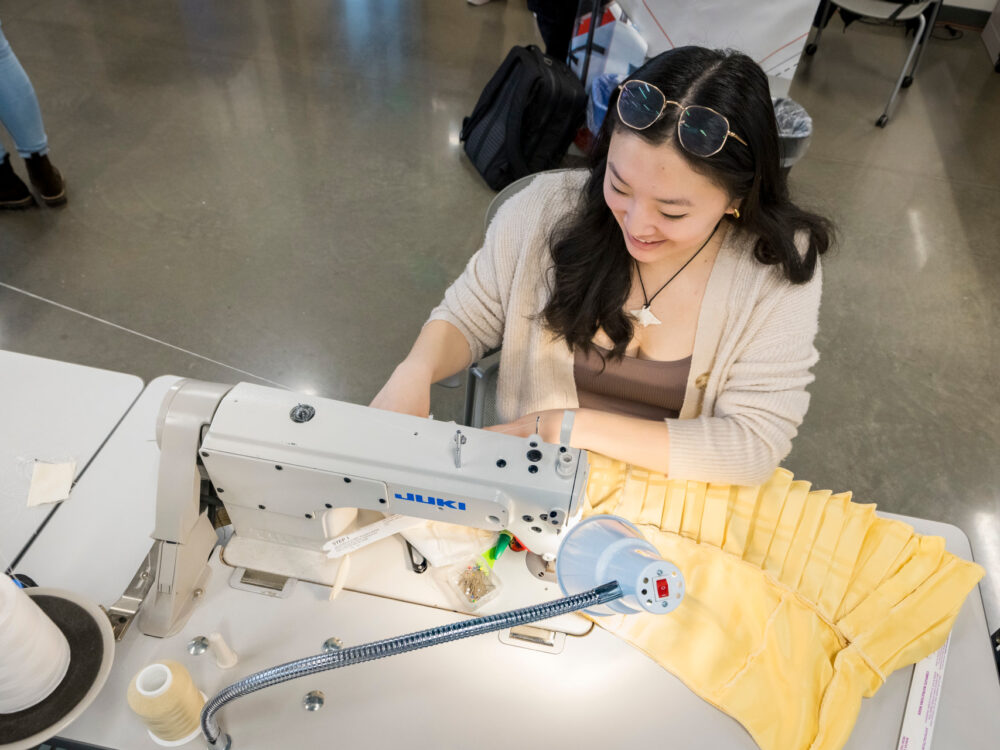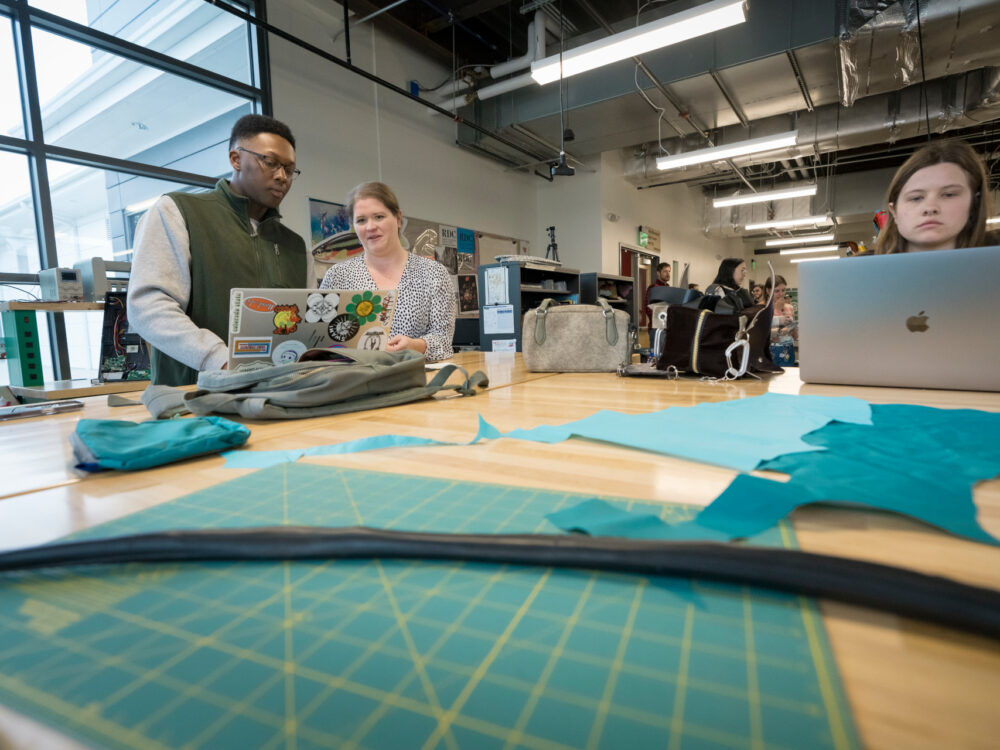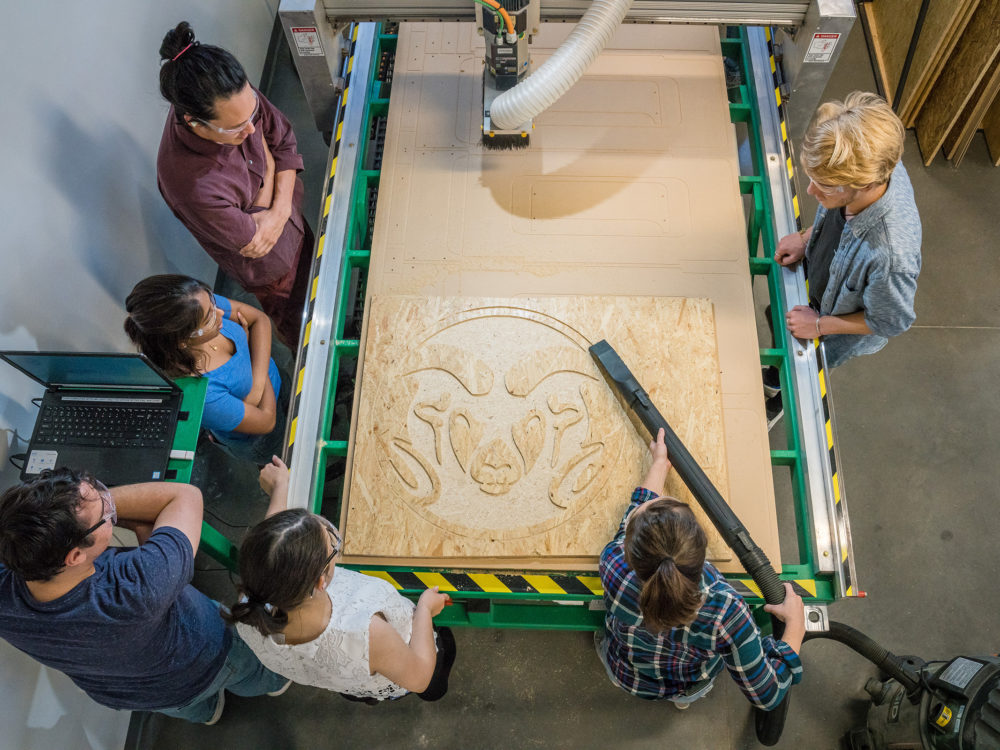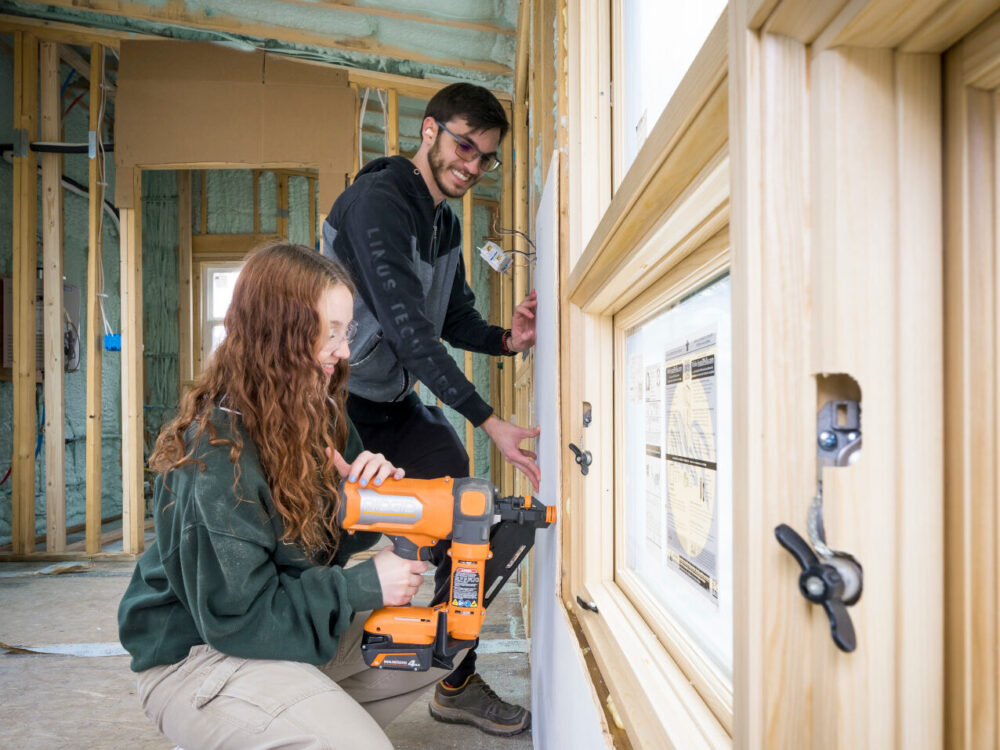Design Thinking at Colorado State University Reframe the way you think, learn, and collaborate.
Courses toward our Undergraduate Certificate or Minor in Design Thinking are offered face-to-face, hybrid, and online. Use the course list below to customize your learning experience.
Are you interested in unlocking design thinking for your high school? Check out the Early College page for options to empower high school students and recent graduates with fun, highly applicable learning opportunities.
Undergraduate Design Thinking Courses Fall Semester
IDEA 110 | Design Your Life With Social Impact
(AUCC 3C/GT-SS3) Practical application of methods and tools from the behavioral sciences to construct an individualized approach to designing fulfilling life experiences. Topics include strategies for building self-awareness, being open to diverse perspectives, managing ambiguity, developing a bias toward action, and re-framing problems as opportunities, toward developing a “whole human” life view.
Learn to apply design thinking tools and decisions making strategies to discover, construct, and individualize your college experience and future career.
Credits: 3
Prerequisite: None
Terms Offered: Fall, Spring, Summer
Delivery: Face-to-Face and CSU Online IDEA 110
Additional Information: Social & Behavioral Sciences (AUCC 3C), Human Behavior, Culture, or Social Frameworks (GT-SS3).
IDEA 210 | Introduction to Design Thinking
(AUCC 3B/GT-AH1) Design thinking is a creative, flexible process that fosters innovation. Content and projects promote building creative competence and an appreciation for thinking across disciplines to develop a new mindset and skillset that guides innovation. Learning tools to develop compelling ideas for meaningful societal and marketplace impact will be explored.
Learn the principles of design thinking in practice with opportunities to work on real-world issues for companies like the Food Bank of Larimer County, Defy Colorado, and Target Corp.
Credits: 3
Prerequisite: None
Semester: Fall, Spring, Summer
Delivery: Face-to-Face and CSU Online IDEA 210
Additional Information: Arts & Humanities (AUCC 3B), Arts & Expression (GT-AH1).
IDEA 310B | Toolbox: 3D Modeling
Employing design theories and methods to 3D modeling projects that promote “iterative tinkering” through exploration of various design processes using computer software.
Learn the essentials of Rhinoceros 3D to build models and explore the prototyping labs 3D printers, laser cutters, and plotter machines.
Credits: 2
Prerequisite: IDEA 210 (may be taken concurrently)
Semester: Fall
Delivery: Face-to-Face
IDEA 310D | Toolbox: Digital Imaging
Design theories and methods employing digital imaging projects that promote “iterative tinkering” experiences through exploration of various design processes.
Gain skills in Photoshop and Illustrator in a course that will benefit all of your future creative endeavors.
Credit: 1
Prerequisite: IDEA 210 (may be taken concurrently)
Semester: Fall
Delivery: Face-to-Face
IDEA 310E | Toolbox: Foundations of Woodworking
Employ design thinking theories and methods to wood projects that promote “iterative tinkering” through exploration of various design processes in a maker space setting.
Learn the basics of woodworking and construction by exploring the various machines that the Wood Lab has to offer. Discover the factors that make wood different than other material options.
Credit: 1
Prerequisite: IDEA 210 (may be taken concurrently)
Semester: Fall (odd years)
Delivery: Face-to-Face
IDEA 310F | Toolbox: Foundations of Textile Design
Employ design thinking theories and methods to textile projects that promote “iterative tinkering” through exploration of various design processes in a maker space setting.
Create your own textile designs and patterns with Photoshop and other creative software’s then get the opportunity to print on fabric in our Prototyping Lab.
Credit: 1
Prerequisite: IDEA 210 (may be taken concurrently)
Semester: Fall
Delivery: Face-to-Face
IDEA 310H | Toolbox: Mixed Reality Design
Introduction to topics in virtual and augmented reality. Learn how to create virtual (i.e., artificial) worlds using a game engine to provide hands-on experience and promote “iterative tinkering” through exploration of various design processes.
Explore the possibilities of augmented and virtual reality in our Ideation Lab and VR Computer Teaching Lab with unique classroom capabilities.
Credits: 3
Prerequisite: IDEA 210 (may be taken concurrently)
Semester: Fall (even years)
Delivery: Face to Face and CSU Online IDEA 310H
IDEA 310J | Toolbox: Graphic Noveling
Employing design thinking theories and methods to projects using graphic novel storytelling to promote “iterative tinkering” through an exploration of various design processes.
Credit: 1
Prerequisite: IDEA 210 (may be taken concurrently)
Semester: Fall (odd years)
Delivery: Face to Face and CSU Online IDEA 310J
IDEA 310K | Toolbox: Technical Sketching and Illustration
Employing design thinking theories and methods to projects using technical sketching and illustration that promotes “iterative tinkering” through exploration of various design processes.
Communicate object function and detailed construction plans by learning how to illustrate the specifications of your ideas and designs.
Credit: 1
Prerequisite: IDEA 210 (may be taken concurrently)
Semester: Fall (even years)
Delivery: Face-to-Face and CSU Online IDEA 310K
IDEA 310L | Toolbox : Creating Things That Think
Employing design thinking theories and methods to projects using micro-controllers and single-board computers that promote “iterative tinkering” through the exploration of various design processes related to embedding computation devices into a design.
Create your own projects in embedded computing technology. Learn to add interaction, connectivity, and sophistication to your designs using Arduinos and Raspberry Pis.
Credits: 2
Prerequisite: IDEA 210 (may be taken concurrently)
Semester: Fall
Delivery: Face-to-Face
IDEA 310M | Toolbox: Co-designing with Communities
Employing design thinking theories and methods to projects using best practices for participatory design with community partners as co-designers to promote “iterative tinkering” and equitable relationships.
Use best practices for participatory design with community partners to promote “iterative tinkering” and equitable relationships.
Credits: 1
Prerequisite: IDEA 210 (may be taken concurrently)
Semester: as needed
Delivery: Face-to-Face
IDEA 310N | Toolbox: Post-Digital Imaging/Printmaking
Employing design thinking theories and methods to projects using post-digital imaging that promotes “iterative tinkering” through the exploration of various design processes related to screen-printing and other forms of post-digital imaging.
Explore transferring your digital creations to tangible products through various printing techniques. Learn eco-UV and cyanotype (blue print) printing methods before moving to screen printing and woodblock printing.
Credit: 1
Prerequisite: IDEA 210 (may be taken concurrently)
Semester: Summer, Fall
Delivery: Face-to-Face
IDEA 310Q | Toolbox: 3D Animation and Storytelling
Basics of 3D modeling and animation with open source software (e.g., Blender 3D) to explore narrative expression.
Credits: 3
Prerequisite: IDEA 210 (may be taken concurrently)
Offered: Fall (odd years)
Instruction: Face-to-Face and CSU Online IDEA 310Q
IDEA 320E | Toolbox: Advanced Woodworking
Employing design thinking theories and methods to projects using wood-based media that promote “iterative tinkering” through the exploration of various design processes and advanced woodworking techniques, such as furniture design.
Build on your wood working skills and create original furniture designs with wood using more complex techniques and the CNC router. If you have prior experience with woodworking techniques, contact us for an override.
Credits: 2
Prerequisite: IDEA 310E (may be taken concurrently)
Semester: Fall (even years)
Delivery: Face-to-Face
IDEA 384 | Supervised College Teaching
Learn skills for facilitating effective learning in one of our design thinking courses.
Credits: 1-3
Prerequisite: IDEA 210 and at least 3 toolbox credits (with a minimum grade of B).
Semester: Fall, Spring, Summer (as needed)
Delivery: Face-to-Face
Registration information: Written approval from instructor and registration override is required.
IDEA 450 | Design Thinking Collaborative
Culminating interdisciplinary experience that offers an opportunity to partner with industry or community partners to propose solutions to vexing real-world problems. Content and activities include a semester-long project to create a problem brief, develop and test prototypes, and deliver professional presentations to diverse audiences.
Design for community partners of your choice, solving real problems by fabricating solutions in the labs. Internship opportunities available following course.
Credits: 3
Prerequisite: Must have completed at least 3 toolbox credits.
Semester: Fall, Spring
Delivery: Face-to-Face and CSU Online IDEA 450
Registration information: Sophomore standing.
IDEA 487 | Design Thinking Internship
Application of design thinking knowledge and integrating it into real-world experiences. Weekly meetings with internship site supervisor foster the development of professional skills and feedback to enhance performance, conduct, ethics, and communication skills for the workplace.
Foster the development of your professional skills and perfect your utilization and understanding of 21st century skills in the workplace.
Credits: 1-6
Prerequisite: IDEA 210 and at least 3 toolbox credits with a minimum grade of B.
Semester: Fall, Spring
Delivery: Face-to-Face
Registration information: Junior standing. See RDC Design Thinking Internship page for more information.
IDEA 496 | Group Study
Instructor-supervised investigation of areas of special interest in interdisciplinary and collaborative topics related to design thinking.
With a team, investigate areas of special interest in interdisciplinary and collaborative topics related to design thinking.
Credits: 1-6
Prerequisite: IDEA 210
Semester: Fall, Spring, Summer (as needed)
Delivery: Face-to-Face
Registration information: Written approval from instructor and registration override is required.
Undergraduate Design Thinking Courses Spring Semester
IDEA 110 | Design Your Life With Social Impact
(AUCC 3C/GT-SS3) Practical application of methods and tools from the behavioral sciences to construct an individualized approach to designing fulfilling life experiences. Topics include strategies for building self-awareness, being open to diverse perspectives, managing ambiguity, developing a bias toward action, and re-framing problems as opportunities, toward developing a “whole human” life view.
Learn to apply design thinking tools and decisions making strategies to discover, construct, and individualize your college experience and future career.
Credits: 3
Prerequisite: None
Terms Offered: Fall, Spring, Summer
Delivery: Face-to-Face and CSU Online IDEA 110
Additional Information: Social & Behavioral Sciences (AUCC 3C), Human Behavior, Culture, or Social Frameworks (GT-SS3).
IDEA 210 | Introduction to Design Thinking
(AUCC 3B/GT-AH1) Design thinking is a creative, flexible process that fosters innovation. Content and projects promote building creative competence and an appreciation for thinking across disciplines to develop a new mindset and skillset that guides innovation. Learning tools to develop compelling ideas for meaningful societal and marketplace impact will be explored.
Learn the principles of design thinking in practice with opportunities to work on real-world issues for companies like the Food Bank of Larimer County, Defy Colorado, and Target Corp.
Credits: 3
Prerequisite: None
Semester: Fall, Spring, Summer
Delivery: Face-to-Face and CSU Online IDEA 210
Additional Information: Arts & Humanities (AUCC 3B), Arts & Expression (GT-AH1).
IDEA 310A | Toolbox: Paper Products
Employing design theories and methods to projects using paper-based media that promote “iterative tinkering” through exploration of various design processes.
Learn how to design, iterate, prototype, and engineer with paper using your hands and tools from the prototyping labs. You’ll learn to fold, joint, connect, and construct functional objects and products as you’ll push the limits of what paper can become.
Credit: 1
Prerequisite: IDEA 210 (may be taken concurrently)
Semester: Spring
Delivery: Face-to-Face
IDEA 310G | Toolbox: Infographics
Employ design theories and methods to infographic projects that promote “iterative tinkering” through exploration of various design processes.
Learn diverse communication techniques to display information and data and meaningfully communicate your ideas towards intended audiences through the use of Adobe creative suite.
Credit: 1
Prerequisite: IDEA 210 (may be taken concurrently)
Semester: Spring
Delivery: Face-to-Face and CSU Online IDEA 310G
IDEA 310I | Toolbox: Foundations of Metal Fabrication
Employing design thinking theories and methods to projects using metal-based media that promote “iterative tinkering” through the exploration of various design processes related to metals.
Explore basics of metal fabrication to bring your designs to life. You’ll learn form and joinery techniques on the MIG, TIG, and Plasma machines in our Metal Lab.
Credit: 1
Prerequisite: IDEA 210 (may be taken concurrently)
Semester: Spring
Delivery: Face-to-Face
IDEA 310M | Toolbox: Co-designing with Communities
Employing design thinking theories and methods to projects using best practices for participatory design with community partners as co-designers to promote “iterative tinkering” and equitable relationships.
Use best practices for participatory design with community partners to promote “iterative tinkering” and equitable relationships.
Credits: 1
Prerequisite: IDEA 210 (may be taken concurrently)
Semester: as needed
Delivery: Face-to-Face
IDEA 310O | Toolbox: Digital Interaction and Game Design
Create interactive experience and serious games using design thinking strategies and digital game development engines (e.g., Unity 3D).
Credits: 3
Prerequisite: IDEA 210 (may be taken concurrently)
Semester: Spring (even years)
Delivery: Face-to-Face and CSU Online IDEA 310O
IDEA 310P | Toolbox: Low-Fidelity Prototyping
Explore design thinking principles and processes through the exploration of low-tech prototyping. In this class, you’ll learn to use all equipment in our prototyping lab, and apply those skills to create low-tech/low-fidelity prototypes based on specific user needs.
Credits: 3
Prerequisite: IDEA 210 (may be taken concurrently)
Semester: Spring
Delivery: Face-to-Face
IDEA 320B | Toolbox: Advanced 3D Modeling
Employing design thinking theories and methods to advanced 3D modeling projects that promote “iterative tinkering” experiences through exploration of design processes.
After learning the basics of Rhinoceros 3D software, stretch the limits of 3D modeling as you dive deeper into model creation and test your ideas in the prototyping lab. If you have experience in another 3D Modeling program and laser cutting, reach out to us for an override into this course.
Credits: 2
Prerequisite: IDEA 310B (may be taken concurrently).
Semester: Spring (even years)
Delivery: Face-to-Face
IDEA320F | Toolbox: Advanced Textile Design
Employing design thinking theories and methods to advanced projects using textile-based media that promote “iterative tinkering” through exploration of various design processes related to textiles.
Take your printed textile design to the next level by learning to use the long arm quilter, CNC embroidery machine, seam welder, laser cutter and sewing machines. IDEA 310F is recommended, but you may reach out to us for an override if you have yet to take IDEA310F.
Credits: 2
Prerequisite: IDEA 310F (may be taken concurrently)
Semester: Spring
Delivery: Face-to-Face
IDEA 320I | Toolbox: Advanced Metal Fabrication
Employing design thinking theories and methods to projects using metal fabrication-based media that promote “iterative tinkering” through the exploration of various design processes related to advanced metal fabrication.
Build on your metal fabrication skills and create original designs with metal using more complex welding techniques and the CNC mill.
Credits: 2
Prerequisite: IDEA 210 (may be taken concurrently)
Semester: Spring (odd years)
Delivery: Face-to-Face
IDEA 380A2 | Toolbox: Artificial Intelligence
Explore how artificial intelligence (AI) can impact design thinking principles and processes by accelerating ideation, optimizing user research, enhancing visual design, and driving ethical design decisions.
Credits: 3
Prerequisite: IDEA 210 (may be taken concurrently)
Semester: Spring
Delivery: Face-to-Face
IDEA 384 | Supervised College Teaching
Learn skills for facilitating effective learning in one of our design thinking courses.
Credits: 1-3
Prerequisite: IDEA 210 and at least 3 toolbox credits (with a minimum grade of B).
Semester: Fall, Spring, Summer (as needed)
Delivery: Face-to-Face
Registration information: Written approval from instructor and registration override is required.
IDEA 450 | Design Thinking Collaborative
Culminating interdisciplinary experience that offers an opportunity to partner with industry or community partners to propose solutions to vexing real-world problems. Content and activities include a semester-long project to create a problem brief, develop and test prototypes, and deliver professional presentations to diverse audiences.
Design for community partners of your choice, solving real problems by fabricating solutions in the labs. Internship opportunities available following course.
Credits: 3
Prerequisite: Must have completed at least 3 toolbox credits.
Semester: Fall, Spring
Delivery: Face-to-Face and CSU Online IDEA 450
Registration information: Sophomore standing.
IDEA 455/MGT 455 | Designing for Defense
A culminating interdisciplinary experience that partners with the United States Department of Defense to propose solutions to vexing problems. Content and activities include a semester-long national security problem. Create a problem brief, develop and test prototypes, and deliver professional presentations to diverse audiences.
Partner with the United States Department of Defense to work on a semester-long national security problem.
Credits: 3
Prerequisite: None
Semester: Spring
Delivery: Face-to-Face and CSU Online IDEA 455
IDEA 487 | Design Thinking Internship
Application of design thinking knowledge and integrating it into real-world experiences. Weekly meetings with internship site supervisor foster the development of professional skills and feedback to enhance performance, conduct, ethics, and communication skills for the workplace.
Foster the development of your professional skills and perfect your utilization and understanding of 21st century skills in the workplace.
Credits: 1-6
Prerequisite: IDEA 210 and at least 3 toolbox credits with a minimum grade of B.
Semester: Fall, Spring
Delivery: Face-to-Face
Registration information: Junior standing. See RDC Design Thinking Internship page for more information.
IDEA 496 | Group Study
Instructor-supervised investigation of areas of special interest in interdisciplinary and collaborative topics related to design thinking.
With a team, investigate areas of special interest in interdisciplinary and collaborative topics related to design thinking.
Credits: 1-6
Prerequisite: IDEA 210
Semester: Fall, Spring, Summer (as needed)
Delivery: Face-to-Face
Registration information: Written approval from instructor and registration override is required.
Undergraduate Design Thinking Courses Summer Sessions
IDEA 110 | Design Your Life With Social Impact
(AUCC 3C/GT-SS3) Practical application of methods and tools from the behavioral sciences to construct an individualized approach to designing fulfilling life experiences. Topics include strategies for building self-awareness, being open to diverse perspectives, managing ambiguity, developing a bias toward action, and re-framing problems as opportunities, toward developing a “whole human” life view.
Learn to apply design thinking tools and decisions making strategies to discover, construct, and individualize your college experience and future career.
Credits: 3
Prerequisite: None
Terms Offered: Fall, Spring, Summer
Delivery: Face-to-Face and CSU Online IDEA 110
Additional Information: Social & Behavioral Sciences (AUCC 3C), Human Behavior, Culture, or Social Frameworks (GT-SS3).
IDEA 210 | Introduction to Design Thinking
(AUCC 3B/GT-AH1) Design thinking is a creative, flexible process that fosters innovation. Content and projects promote building creative competence and an appreciation for thinking across disciplines to develop a new mindset and skillset that guides innovation. Learning tools to develop compelling ideas for meaningful societal and marketplace impact will be explored.
Learn the principles of design thinking in practice with opportunities to work on real-world issues for companies like the Food Bank of Larimer County, Defy Colorado, and Target Corp.
Credits: 3
Prerequisite: None
Semester: Fall, Spring, Summer
Delivery: Face-to-Face and CSU Online IDEA 210
Additional Information: Arts & Humanities (AUCC 3B), Arts & Expression (GT-AH1).
IDEA 310N | Toolbox: Post-Digital Imaging/Printmaking
Employing design thinking theories and methods to projects using post-digital imaging that promotes “iterative tinkering” through the exploration of various design processes related to screen-printing and other forms of post-digital imaging.
Explore transferring your digital creations to tangible products through various printing techniques. Learn eco-UV and cyanotype (blue print) printing methods before moving to screen printing and woodblock printing.
Credit: 1
Prerequisite: IDEA 210 (may be taken concurrently)
Semester: Summer, Fall
Delivery: Face-to-Face
IDEA 384 | Supervised College Teaching
Learn skills for facilitating effective learning in one of our design thinking courses.
Credits: 1-3
Prerequisite: IDEA 210 and at least 3 toolbox credits (with a minimum grade of B).
Semester: Fall, Spring, Summer (as needed)
Delivery: Face-to-Face
Registration information: Written approval from instructor and registration override is required.
IDEA 496 | Group Study
Instructor-supervised investigation of areas of special interest in interdisciplinary and collaborative topics related to design thinking.
With a team, investigate areas of special interest in interdisciplinary and collaborative topics related to design thinking.
Credits: 1-6
Prerequisite: IDEA 210
Semester: Fall, Spring, Summer (as needed)
Delivery: Face-to-Face
Registration information: Written approval from instructor and registration override is required.
Online Certificate in Human-Centered Design Thinking Graduate-Level Courses
IDEA 510 | Processes of Human-Centered Design Thinking
Introduction to theoretical concepts, philosophies, and psychosocial processes associated with design thinking in design and nondesign contexts. Drawing from perspectives in design cognition, cognitive psychology and the learning sciences, human-centered interaction, and creativity. Examine how design thinking facilitates understanding of our environment; identify and manage ill-defined societal problems, and communicate with diverse stakeholders and team members.
Experience first hand how design thinking facilitates understanding of our environment and the identification of ill-defined societal problems in both design and nondesign contexts.
Credits: 3
Prerequisite: None
Semester: Spring
Delivery: CSU Online IDEA 510
IDEA 520 | Methods for Human-Centered Design Thinking
Introduces designing and conducting human-centered research and co-design methods common to innovation frameworks such as design thinking. Practical strategies are introduced for exploratory (problem-finding), generative, and evaluative (user testing) processes utilizing research methods that are original to design, adapted from other disciplines, and traditionally used across disciplines.
Explore designing and conducting human-centered research and co-design methods common to innovation frameworks.
Credits: 3
Prerequisite: None
Semester: Fall
Delivery: CSU Online IDEA 520
IDEA 555/MGT 555 | Managing Design for Defense
Interdisciplinary teams work on national security challenges in close contact with national security agencies (sponsors). Utilizing entrepreneurial thinking, lead and manage teams of undergraduates as they work to employ the Lean Launchpad methodology and develop concepts to solve real-world challenges for sponsors in special operations forces, the intelligence community, and government agencies.
Credit: 3
Prerequisite: BUS 600 to 699 (at least 3 credits), or MGT 600 to 699 (at least 3 credits), or IDEA 510
Delivery: Face-to-Face and CSU Online IDEA 555
Registration Information: Bachelor’s degree is required.
IDEA 580A2 | Design Thinking for Educators
Innovative pedagogical approaches to incorporate design thinking into your learning context. Focus on teaching practices and tools to bring dynamic design thinking experiences to students of all ages in K-12, university, and informal learning spaces.
Credit: 3
Prerequisite: None
Semester: Summer
Delivery: CSU Online IDEA 580A2








